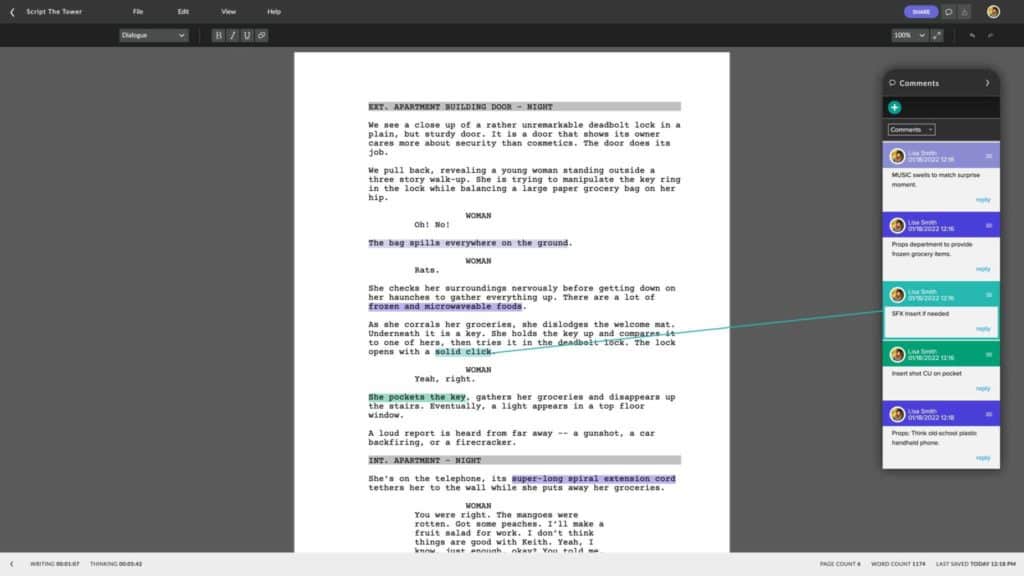Everyone loves a great movie but very few people who sit in a movie theatre are aware of all the work that goes into making one. Like the foundation that creates the groundwork for a house, a movie script is the foundation upon which a movie is built.
A movie script is a written document that details all of the narrative and visual elements for a feature-length or short movie. This document includes very specific formatting, namely action paragraphs, character dialogue, and in some cases, visual and sound cues.
Movie scripts are used as a roadmap by the director, producers, crew, and cast throughout the production of a movie to keep them all unified under a singular creative vision.

All-time-great film director Alfred Hitchcock underlined the importance of a movie script when he said “to make a great film you need three things – the script, the script, and the script.”
As one can imagine, it is not an easy task to write a great movie script, and even though tens (if not hundreds) of thousands of scripts are written each year, only a handful of them make it to the big screen. Writing a great movie script requires dedication to the craft of screenwriting, a unique vision, and an expansive knowledge of the movie industry.
Who Writes a Movie Script?
Movie scripts are written by screenwriters, a creative professional who specializes in writing and developing screenplays for film, either based on an original idea or an adaptation from a book or story that has already been told through a different medium.
Successful screenwriters often spend years perfecting their craft as they learn the most powerful ways to write engaging dialogue and build emotionally compelling plots.
Although some successful screenwriters receive formal training in filmmaking or screenwriting, education is not a requirement to become a great screenwriter. The most important qualities shared by screenwriters are dedication and commitment to writing a great story.
Screenwriters are generally contracted as freelancers; they are not hired as employees by large studios. It is common for an up-and-coming screenwriter to write a spec (speculation) script which they then pitch to studios for sale.
Alternatively, a screenwriter may be commissioned by a studio to write a screenplay, in which case they will work closely with the producers and studio executives in the development of the movie script.
Some screenwriters can write in multiple genres (action, comedy, drama, sci-fi, horror, etc.) but most screenwriters prefer to specialize in one of these categories and often become known for their work in that particular area. However, what sets great screenwriters apart are the new innovative ideas and styles they add to each genre.
For example, Billy Wilder explored themes of moral judgment and cynicism while the Coen Brothers investigated human weaknesses through the use of irony and detached humor.

4 Tips for Writing a Movie Script
If you are just getting acclimated with the film industry and screenwriting, you may be wondering how to create a movie narrative that is both powerful and professional.
Recommended Celtx Article: How to Write a Movie Script | A Comprehensive Guide
The good news is that there are some tried-and-true strategies you can follow that have been tested and proven by successful screenwriters:
1. Pick Your Genre
Although there are examples of directors blending genres, it is important to realize that this is a risky choice for someone who is not yet well established in the filmmaking world. A lot of beginner screenwriters make the mistake of not sticking to one specific genre, which leads to their movie scripts getting rejected by studios and producers.
Pick your genre and theme carefully; make sure to read movie script samples of successful movies that focus on similar themes to learn as much as you can about the techniques used by experienced screenwriters so you can later replicate them.
2. Write Your Logline
A logline is a one-sentence description of a movie. Writing out a logline that includes the main conflict and protagonist of your story will help you dig deeper into the creative writing process. Some screenwriters like to come up with multiple logline options before writing a screenplay, which they then narrow down to identify the right one.
3. Create an Outline
Once you have a logline and a general idea of the screenplay that you would like to write, create an outline. An outline is generally a very detailed roadmap of the screenplay that will include the main events of your screenplay, the actions, and even lines of dialogue.
4. Stick to Formatting
A screenplay has very specific formatting rules that distinguish it from other forms of written work such as novels or plays. When writing a screenplay, there is no room for creative freedom when it comes to the way the screenplay is formatted; make sure you become familiar with all the rules if you want your screenplay to look professional.
Screenwriting softwares such as Celtx will make it very easy for you to format your screenplay as they incorporate industry-standard formatting into their programs.

How Long Does it Take to Write a Script for a Movie?
Professional screenwriters commissioned by studios or producers are usually given a time range between one to three months (30 to 90 days) to complete the first draft of a movie script; this draft will then go through several iterations.
Since they are experienced, these screenwriters usually have a daily writing routine and a clear estimate of how long it takes for them to finish a screenplay. For reference, a feature-length movie script is usually between 80-120 pages. There have been many cases, however, where it took a screenwriter years to finalize a successful script.
A movie script example that took over ten years to complete is Inglourious Basterds written by legendary director Quentin Tarantino.
If you are a beginner screenwriter working on a spec script, you should take as much time as you need to make sure that the script reflects your best work. As you write more scripts and get more experienced, you will notice that it will take you less time to complete each script.
The Bottom Line
The script is undoubtedly the most important component that goes into making a successful movie. Any aspiring screenwriter who doesn’t have a formal education in screenwriting can still write a great script by following proven strategies that are used by professionals throughout the industry . . . and the world.

